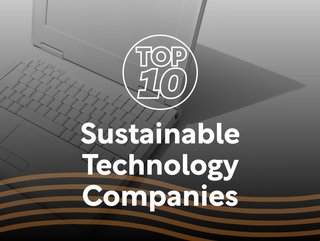
Sustainability is largely driven by companies’ strategies to eliminate greenhouse gas (GHG) emissions or the social impact of an organisation, but without targets and deadlines, there is no way of benchmarking certain metrics.
Aside from this, many of the impacts of a business are yet to be seen visually as their strategies are wider components of an overwhelming challenge. With that said, companies have some work to do in order to claw back from the tipping point of climate change, which is the 1.5-degree emissions quashing target.
Here are some of the technology leaders encouraging a digitally-driven approach to sustainability.
10. Schneider Electric

The leading data centre firm and top company for Sustainability was recognised as the most sustainable company globally in 2021 and the premier PPA marketplace solution provider in 2022 by Guidehouse Insights.
Its EcoStruxure Smart Grid was influential in Italy’s transformation, achieving 40% renewable energy coverage across the country. Schneider Electric aims to supply green electricity to 50 million individuals by 2025.
9. Dell Technologies

Dell Technologies is working towards its net-zero emissions goals for 2050 with Scope 1, 2 and 3 targets mapped out by the Science-Based Targets initiative (SBTi). In its latest ESG report, Dell Technologies notes 155.5 million kilograms of sustainable materials were cycled into its packaging. Meanwhile, 39.2 million plastics have been removed from the ocean as a result of effort and investment from Dell Technologies. From a diversity perspective, Dell Technologies is ranked number 10 in Forbes’ World’s Best Employers.
8. Meta

Meta set a target to reduce its Scope 1 and Scope 2 emissions by 42% in 2031. This target drives the current reduction efforts as the company highlights 12.3 million metric tons eliminated since 2018.
Since 2010, Meta has shown net-zero emissions across its global operations, recording a significant reduction in operational emissions by 94% based on its 2017 baseline. Breaking this down, we see that this is greatly supported by its 100% renewable energy implementation across its data centres.
7. NVIDIA

Through strategic efforts, NVIDIA actively seeks out sustainable opportunities when building new or expanding data centres. This plays into its carbon prevention and well-thought-out processes leverage efficiency from the beginning.
Figures aside, NVIDIA’s technology forms the backbone of a sustainable societal shift, electrification and AI-driven vehicles. Autonomy will allow greater efficiency with simplified transport, and NVIDIA’s chips allow the smartest of integrations into cars and other transport methods.
6. IBM

Breaking its report down into environment, social and governance (ESG), IBM is driven by ethical, equitable, global impact as it supports businesses to enter the digital landscape. In 2022, the company implemented conservation projects, resulting in savings of 71,000 megawatt-hours of energy and 25,600 metric tons of CO2.
From a social perspective, IBM leaves nobody behind in the sustainable digital era as it employs efforts to train more people through apprenticeships and career-enriching investments.
5. Intel

In 2022, Intel saw some astonishing achievements in its all-encompassing approach to impact reduction across its operational footprint. 67% of manufacturing waste was upcycled, showcasing the circular economy developing at Intel. Alongside this, the company increased its use of renewable energy to 100% in the US, Europe, Israel and Malaysia, and reported on track in Costa Rica. This brings the global average to 93% for the company. In terms of water conversation, another strategic pillar Intel saved approximately 9.6 billion gallons.
4. Apple

The latest report from Apple shows great progress towards its carbon reduction goal. In 2023, the company introduced its first-ever carbon-neutral products and reached an overall 45% reduction in its emissions against its 2015 baseline. This not only represents major steps for the company, but also aligns its sustainability strategy with financial success. The tech giant increased its revenue by 65% in the same period—showcasing the full force of Apple’s strategy to reduce emissions by 75% in 15 years.
3. Microsoft

The efforts of Microsoft can be seen in various ways, such as its carbon contracting of more than 1.4 million metric tons of carbon removal in 2022. The technology firm also signed a number of power purchase agreements (PPAs) to ensure its global operations can secure renewably sourced energy in the future. With this the company expects 13.5 gigawatts of renewable electricity supplies from 135 clean energy projects.
2. Amazon Web Services

90% of electricity used by Amazon was attributed to renewable sources as of 2022 and rigorous water reduction efforts were put in place, resulting in 3.9 billion litres returned to communities surrounding Amazon’s operations.
As a technology provider though, AWS made its data centre infrastructure five times more efficient across Europe, compared to other functions across the region. AWS’s approach encompasses energy, water and waste as the firm implements more carbon reduction efforts.
1. Google

Google has shown its true form recently as a major innovator in climate technology. This puts it on a sustainable map (quite literally) ensuring that drivers and travellers have insights to decarbonise transport, help countries predict weather events and natural disasters, and assist with emissions reduction activities of anyone who uses its digital products and services.
Of its own emissions, Google has calculated this since 2006 and reported publicly to the Carbon Disclosure Project. In 2022, the company reported emissions progress of 10.2 million metric tCO2e, which was a result of changes to its Scope 3 accounting methodology. This brought the company’s recorded emissions below that of its pre-COVID level.
It’s not all about emissions, though, as Google also engages in activities to encourage greater governance across the board, with functions such as risk management, stakeholder engagement, and policy development at the forefront of proceedings.
- DP World: An ‘Unwavering Commitment’ to SustainabilitySupply Chain Sustainability
- PwC & Microsoft use AI to Help Clients Transform to Net ZeroTech & AI
- Walmart and Tide Campaign: Why Cold-Water Laundry is BestSustainability
- Is Unilever’s ESG Rethink Good Business or Green Betrayal?Sustainability






